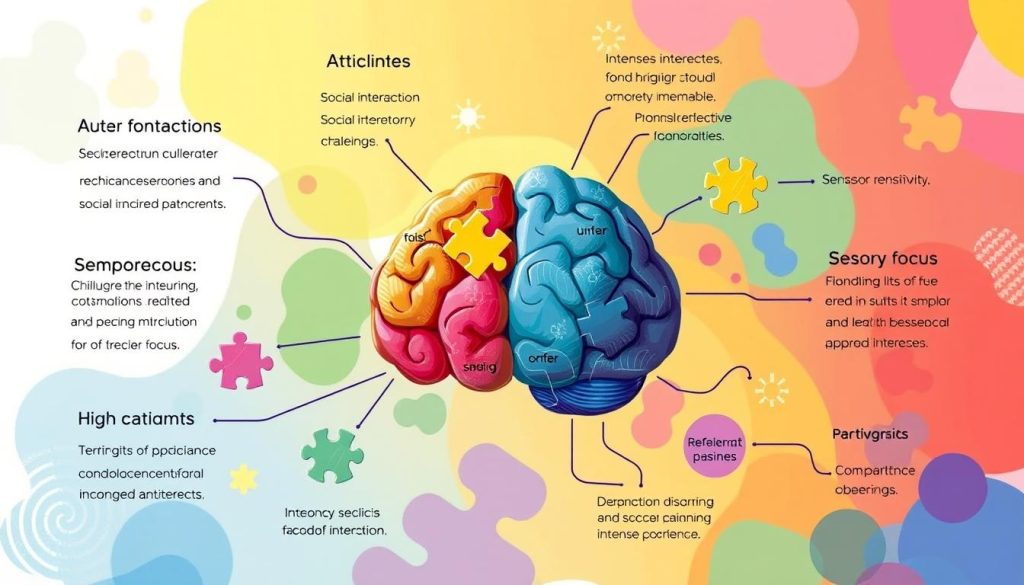High functioning autism is a complex condition within the autism spectrum disorder. This guide explores its unique traits and how it affects people’s lives.
We’ll look into the details of high functioning autism. You’ll learn about its definition, daily life impact, diagnosis, challenges, and strengths.
If you’re newly diagnosed, supporting a loved one, or just curious, this guide is for you. It offers valuable insights into high functioning autism and the autism spectrum disorder. Let’s start our journey to understand this fascinating aspect of human neurodiversity.
Understanding High Functioning Autism: Definition and Overview
High functioning autism refers to people on the autism spectrum disorder with average or above-average intelligence. They can speak, read, and write well. Yet, they often find social interactions and communication hard.
Historical Background of High Functioning Autism
The idea of high functioning autism started in the 1980s. It was first linked to asperger’s syndrome, named after Hans Asperger. Asperger described kids with autistic traits but normal language and intelligence.
Relationship to Autism Spectrum Disorder
High functioning autism is a part of the autism spectrum disorder. It’s not a separate diagnosis. It’s a way to describe those with autism who have better cognitive and language skills. They might struggle in social situations and with sensory processing.
Current Understanding in Medical Community
Now, the medical field sees autism as a range of conditions. The term “high functioning” is not an official diagnosis. Instead, doctors use specific criteria to diagnose autism spectrum disorder and understand each person’s needs and strengths.
| Aspect | High Functioning Autism | Classic Autism |
|---|---|---|
| Intelligence | Average or above | Can vary widely |
| Language Skills | Well-developed | May be limited or absent |
| Social Challenges | Present but less severe | Often more pronounced |
| Support Needs | Typically less intensive | Often more intensive |
Understanding high functioning autism helps create tailored support strategies for those on the spectrum. It’s important to see that each person with autism has unique strengths and challenges, no matter where they are on the spectrum.
What Is High Functioning Autism and Its Place on the Spectrum

High functioning autism is on the milder side of the autism spectrum. People with this condition usually have average or above-average intelligence. They can speak well and manage daily tasks, but struggle with social interactions and communication.
The autism spectrum includes a wide range of abilities and challenges. At one end are those who need a lot of support. At the other end are those with high functioning autism, who may need less help in daily life.
High-functioning autism traits include:
- Strong verbal skills
- Above-average intelligence in specific areas
- Difficulty reading social cues
- Intense focus on particular interests
- Preference for routines and structure
Despite their abilities, individuals with high functioning autism may struggle with:
- Making and maintaining friendships
- Understanding non-verbal communication
- Adapting to changes in routine
- Sensory sensitivities
Recognizing high functioning autism can be tricky. Its subtle signs are often missed, even in children who do well in school. Early support can greatly improve their lives.
| Aspect | Typical Autism | High Functioning Autism |
|---|---|---|
| Language Skills | May have delayed or limited speech | Usually fluent speech |
| Intelligence | Varies widely | Average to above-average |
| Social Interaction | Often severely impaired | Challenging but manageable |
| Independence | May require significant support | Often capable of independent living |
Distinguishing Features of High Functioning Autism
High-functioning autism shows itself in special ways. People with it have unique social communication, behavior, and thinking skills. Knowing these traits helps us spot autism symptoms and offer the right support.
Social Communication Patterns
Those with high-functioning autism might find it hard to pick up on social clues and nonverbal signs. They could have trouble keeping eye contact or understanding facial expressions. Yet, many learn to handle social situations well.
Behavioral Characteristics
Repetitive actions and strong interests are common in high-functioning autism. This can mean sticking to routines very closely or being really into certain subjects. These habits help them feel safe or comfortable.
Cognitive Abilities and Intelligence
People with high-functioning autism often have average to above-average smarts. They might be great at details or solving problems logically. But, they might face challenges in other areas, like planning and organizing.
| Area | Strengths | Challenges |
|---|---|---|
| Social Communication | Direct communication style | Difficulty with small talk |
| Behavior | Strong focus on interests | Rigidity in routines |
| Cognition | Exceptional memory | Trouble with abstract concepts |
It’s key to know these special traits to support people with high-functioning autism. By seeing both their strengths and challenges, we can make places more welcoming for everyone. This way, we celebrate the diversity of brains and minds.
Early Signs and Symptoms in Children

It’s important to spot the early signs of autism in kids. This helps get them the help they need early on. Parents and caregivers should watch for certain behaviors that might mean a child has autism.
Children with autism might act differently in social situations. They might not make eye contact or understand social hints. They might also like to play by themselves more than with others.
Language skills can also show signs of autism. Some kids might talk a lot but have trouble keeping a conversation going. They might use big words but not know how to use them right.
Repetitive actions and strong interests are big signs too. A child might really know a lot about one thing but not much else. They might also stick to the same routine or do the same actions over and over, like hand-flapping.
Sensory issues are another clue. Kids with autism might be too sensitive to light, sound, or touch. They might react strangely or try to avoid these things. Or, they might seek out strong sensory experiences.
- Difficulty with social interactions
- Advanced language skills but struggle with conversations
- Intense focus on specific interests
- Sensory sensitivities or seeking behaviors
- Preference for routines and repetitive behaviors
If you see these signs in your child, get them checked by a professional. Finding out early if a child has autism can really help. It means they can get the right help and support sooner.
Diagnostic Process and Criteria
Getting an autism diagnosis is a detailed process. Experts use many methods to check for autism spectrum disorder. This journey takes time but is key for understanding and support.
Professional Assessment Methods
Experts use different tools to check for autism. They look at behavior, cognitive tests, and talk to family members. They search for patterns in communication, social skills, and behavior that match autism spectrum disorder.
Required Medical Evaluations
A detailed autism diagnosis needs many medical tests. These may include:
- Developmental screenings
- Hearing and vision tests
- Genetic testing
- Neurological exams
These tests help rule out other conditions and give a clear picture of an individual’s needs.
Diagnostic Timeline
The time it takes for an autism diagnosis varies. It can take weeks or months to finish all the needed tests. Early signs may show in toddlers, but some people don’t get diagnosed until they’re adults. Being patient is important during this time. A thorough assessment ensures accurate results and the right support.
The Connection Between Asperger’s Syndrome and High Functioning Autism
Asperger’s syndrome and high functioning autism are closely linked in the autism spectrum disorder. Over time, our understanding of these conditions has grown. This has led to changes in how we view them.
Earlier, Asperger’s syndrome was seen as a distinct diagnosis. People with it had strong verbal skills and average or above-average intelligence. Yet, they faced social challenges. High functioning autism described those with autism who had fewer delays in language or thinking.

Now, the medical field sees both as part of the autism spectrum disorder. This change acknowledges the spectrum’s wide range of experiences and abilities. Though some terms are used, they are not official in the DSM-5 anymore.
| Aspect | Asperger’s Syndrome | High Functioning Autism |
|---|---|---|
| Language Development | Typically on time | May have early delays |
| Cognitive Abilities | Average or above | Average or above |
| Social Challenges | Present | Present |
| Current Diagnostic Status | Part of ASD | Part of ASD |
Understanding these connections is key to better support for those on the autism spectrum. It highlights the need for tailored support. This approach helps address each person’s unique strengths and challenges.
Common Challenges in Daily Life
People with high-functioning autism face unique challenges every day. These challenges can make everyday tasks harder. They affect many parts of daily life.
Social Interaction Difficulties
Those with high-functioning autism often struggle with social cues and communication. They might find it hard to understand sarcasm or keep eye contact. This can lead to feelings of isolation and misunderstandings in social settings.
Executive Functioning Issues
Executive functioning skills, like organization and time management, can be tough for them. They might struggle with prioritizing tasks or following instructions. Adapting to changes in routine can also be challenging.
Sensory Processing Challenges
Many with high-functioning autism have sensory sensitivities. They might be overwhelmed by loud noises or bright lights. These sensitivities can make places like grocery stores or crowded areas uncomfortable or even distressing.
It’s important to understand these challenges. This helps create supportive environments. It also helps develop strategies to make daily life easier for those with high-functioning autism.
Strengths and Abilities Associated with High Functioning Autism
People on the autism spectrum often have special strengths and abilities. These traits can be very helpful in many areas of life. Let’s look at some of these amazing qualities.

Those with high-functioning autism are known for their attention to detail. This skill helps them do well in jobs that need precision. They often succeed in fields like engineering, quality control, and data analysis.
They also have a strong focus on specific interests. This focus can make them experts in certain areas. Some become very knowledgeable in subjects like astronomy, history, or technology.
- Strong memory and recall
- Logical thinking and problem-solving skills
- Creativity and out-of-the-box thinking
- Honesty and directness in communication
Many on the autism spectrum have great visual-spatial skills. This talent can lead to success in graphic design, architecture, and computer programming. Their unique view often brings new ideas and artistic works.
| Strength | Potential Career Paths |
|---|---|
| Attention to detail | Quality assurance, proofreading, research |
| Pattern recognition | Data analysis, programming, scientific research |
| Visual-spatial skills | Graphic design, engineering, architecture |
| Focus and concentration | Writing, software development, academia |
By recognizing and supporting these strengths, people with high-functioning autism can find happiness and success. Embracing neurodiversity helps us create a more welcoming society. This society values the unique contributions of everyone on the autism spectrum.
Support Strategies for Adults with High Functioning Autism
Autistic adults face special challenges every day. The right support can help them succeed in many areas. Let’s look at some important ways to support adults on the autism spectrum.
Workplace Accommodations
Many autistic adults do well at work with the right help. Employers can offer things like noise-canceling headphones and flexible hours. They can also provide quiet spaces and clear, written instructions.
These changes make work places where autistic people can shine. They can show off their skills and talents.
Social Support Networks
Having a strong support network is key for autistic adults. This includes:
- Autism support groups
- Online forums for autistic individuals
- Therapists specializing in autism
- Trusted friends and family members
These connections offer emotional support and practical advice. They also give a sense of belonging.
Life Skills Development
Improving life skills is important for independence. Autistic adults can benefit from:
- Time management workshops
- Cooking classes
- Financial planning sessions
- Social skills training
These programs help with everyday tasks. They improve quality of life. With the right support, autistic adults can live fulfilling, independent lives.
Educating Children with Autism
Teaching kids with autism needs special methods. Schools in the U.S. are changing how they teach to help these students. They aim to make learning better and help students do well in school.

Visual aids are a big help. Kids with autism often learn better with pictures and colors. Teachers use things like picture schedules and color-coding to help students remember lessons.
Structured teaching is also important. It means having set routines and clear rules. This helps students feel less anxious and lets them focus on learning. Schools also offer quiet areas for students who feel too stressed.
- Social skills training integrated into the curriculum
- Sensory-friendly classrooms with adjustable lighting and minimal distractions
- Technology-aided instruction, including educational apps and assistive devices
Individualized Education Programs (IEPs) are key. They set goals and make plans for each student. This ensures kids with autism get the support they need to do well in school and with friends.
Learning together is also good. Pairing students with autism with others helps them learn social skills. It makes classrooms more welcoming for everyone, teaching everyone to understand and care for each other.
Building Social Skills and Relationships
For autistic adults, building social skills and relationships can be tough but worth it. These skills help manage autism symptoms and boost quality of life. Let’s look at ways to improve communication, make friends, and date.
Communication Techniques
Good communication is essential for autistic adults. Try active listening, keep eye contact, and speak clearly. Role-playing can help you get better at talking in social situations. Social skills groups are great places to practice these skills with support.
Friendship Development
Creating friendships takes time and effort. Start by joining clubs or groups that match your interests. This gives you something to talk about and connect over. Be patient and open about what you need. True friends will value your unique view and qualities.
Dating and Intimate Relationships
Dating can be tricky for autistic adults. Begin by telling your date about your expectations and boundaries. Online dating can be helpful, giving you time to think about interactions. Being honest about your autism can lead to deeper understanding and better relationships.
| Relationship Stage | Key Strategies |
|---|---|
| Communication | Practice active listening, use clear language |
| Friendship | Join interest-based groups, be patient |
| Dating | Set clear boundaries, consider online platforms |
Resources and Support Networks
Living with high functioning autism can be tough, but you’re not alone. There are many resources and support networks available to help. These can make a big difference in daily life for those on the autism spectrum.
Online Communities
The internet has opened up new ways for people with autism to connect. Online forums and social media groups offer safe spaces to share experiences and advice. These virtual communities can be great for making friends who truly understand.
Professional Services
Autism support professionals play a key role in helping individuals thrive. Therapists, counselors, and job coaches can provide tailored strategies for managing challenges. Many offer services both in-person and online, making help more accessible than ever.
Family Support Groups
Families affected by autism can find comfort and guidance in support groups. These gatherings allow parents and siblings to share tips, vent frustrations, and celebrate victories. Local autism organizations often host these meetings, fostering a sense of community.
FAQ
Q: What is high functioning autism?
A: High functioning autism is for people on the autism spectrum with average or above-average smarts. They often have good language skills. Yet, they might find social interactions and communication hard. They can usually handle daily tasks on their own.
Q: How is high functioning autism different from Asperger’s syndrome?
A: High functioning autism and Asperger’s syndrome are very similar. Asperger’s is no longer a separate diagnosis in the DSM-5. People once diagnosed with Asperger’s are now seen as part of the autism spectrum. The main difference was that Asperger’s didn’t have early language delays.
Q: What are some common traits of high functioning autism?
A: Traits include trouble with social interactions and reading non-verbal cues. They might have intense interests and prefer routine. They also have sensory sensitivities. Their verbal skills are strong, but they struggle with conversation nuances.
Q: How is high functioning autism diagnosed?
A: Diagnosis involves a team of specialists like psychologists and speech therapists. They use observations, interviews, and cognitive tests. They also check how well the person adapts to daily life.
Q: Can adults be diagnosed with high functioning autism?
A: Yes, adults can get diagnosed with high functioning autism. Many didn’t get diagnosed as kids because autism awareness was low back then. Getting diagnosed as an adult can help them get support.
Q: What are some strengths associated with high functioning autism?
A: People with high functioning autism often have great attention to detail and focus. They have strong memory and analytical skills. They’re good at recognizing patterns and often do well in science and tech fields.
Q: How can I support a loved one with high functioning autism?
A: To support them, understand their unique needs and be patient with social challenges. Respect their need for routine and advocate for help in school or work. Encourage their strengths and interests.
Q: Are there specific therapies for high functioning autism?
A: There’s no single therapy for everyone. But, CBT, social skills training, and speech therapy can help. The best therapy is one that fits the person’s specific needs.
Q: Can people with high functioning autism live independently?
A: Many can live on their own, work, and have relationships. How independent they are varies. Some might need help with daily tasks.
Q: How can schools support students with high functioning autism?
A: Schools can help with individual plans, sensory-friendly spaces, and social skills programs. Teachers should learn autism-friendly teaching. Accommodations like extra time on tests or quiet spaces can also help.

















